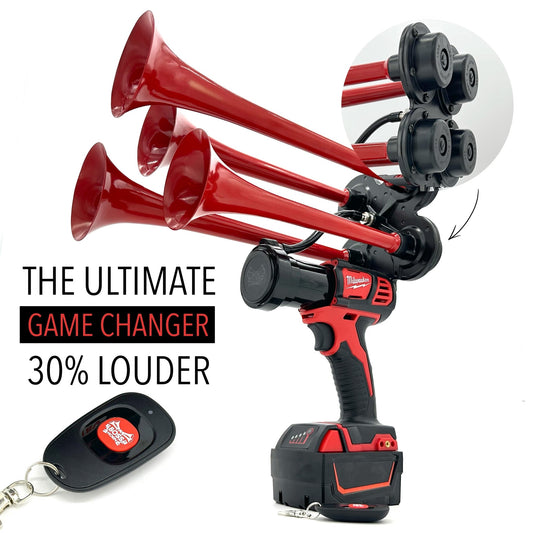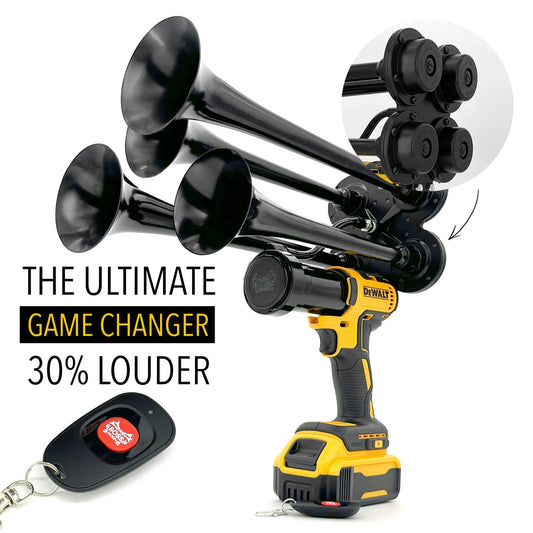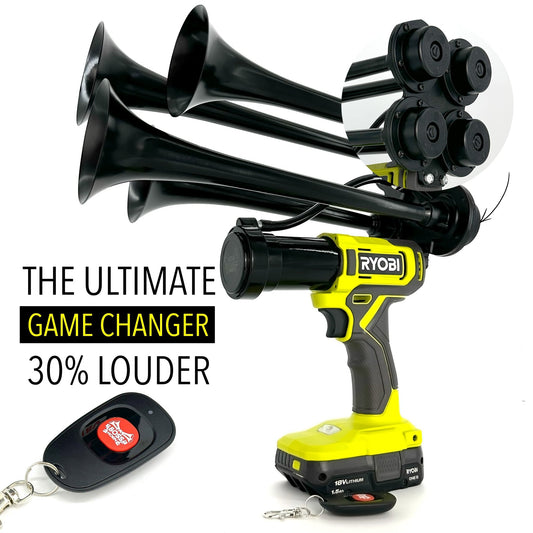The blaring sound of a train horn can be heard from miles away, serving as a warning signal to drivers and pedestrians alike. In recent years, truck owners have been installing train horns on their vehicles to grab attention and make a statement on the road. However, the legality of these powerful horns has come into question due to the potential to cause confusion and create safety hazards.
The use of train horns on trucks is a relatively new trend that has gained popularity among enthusiasts looking to customize their vehicles. These horns emit a loud and distinctive sound that can reach up to 150 decibels, much higher than the standard car horn. While some appreciate the novelty and attention-grabbing nature of train horns on trucks, others are concerned about the potential for noise pollution and danger on the road.
One significant issue with train horns on trucks is the confusion they can cause for other drivers and pedestrians. The loud and unexpected sound may startle individuals and lead to accidents or near-misses on the road. In addition, the noise pollution generated by these horns can be disruptive to communities and wildlife along trucking routes. To address these concerns, lawmakers and transportation authorities have started to crack down on the use of train horns on trucks, implementing regulations and fines for violators.
As the debate over the legality of train horns on trucks continues, it is essential for truck owners to be aware of the potential consequences of installing these horns on their vehicles. While the appeal of a powerful and attention-grabbing horn may be tempting, the safety and well-being of others on the road should always be the top priority. By adhering to regulations and avoiding the use of train horns on trucks, drivers can help maintain a safer and more peaceful environment for everyone.
Are Train Horns on Trucks Illegal?
Train horns on trucks are often loud and can cause disturbances to other drivers and pedestrians. In many regions, these loud horns are considered a safety hazard and are therefore illegal to use on public roads. However, some truck owners may still install train horns on their vehicles, risking fines or citations from law enforcement. To understand the legality and regulations surrounding train horns on trucks, it is important to delve deeper into local laws and transportation guidelines. Let's explore the reasons behind the prohibition of train horns on trucks in the following section.
Train horns installed on trucks have been a topic of debate in recent years. Many people believe that these types of horns are illegal because they are too loud and can be disruptive to other drivers on the road. However, the legality of train horns on trucks actually depends on a few key factors.
One of the main factors to consider is whether the train horn meets certain sound level regulations set by the Department of Transportation (DOT). In general, train horns are required to produce a sound level of at least 96 decibels at a distance of 100 feet. If a truck horn meets these requirements, it may be considered legal for use on public roads.
Another factor to consider is whether the truck owner has obtained the necessary permits and certifications for installing a train horn. In some states, truck owners may be required to obtain a special permit or certification to install a train horn on their vehicle. Failure to do so could result in a fine or other legal consequences.
It's also important to consider the specific laws and regulations in your state regarding the use of train horns on trucks. Some states have stricter regulations than others when it comes to the use of train horns on vehicles. It's important to familiarize yourself with the laws in your state to ensure that you are in compliance.
In conclusion, the legality of train horns on trucks is not cut and dry. It depends on a variety of factors such as sound level regulations, permits, and state laws. It's important to do your research and make sure that you are in compliance with all relevant regulations to avoid any legal issues or fines.
Statistics:
- According to the Federal Railroad Administration, there were approximately 2,217 highway-rail grade crossing incidents in 2020.
- The National Highway Traffic Safety Administration reported that 152 people were killed and 310 were injured in accidents at highway-rail grade crossings in 2020.
- A study by the Federal Motor Carrier Safety Administration found that the improper use of train horns on trucks can contribute to accidents and fatalities on the road.
https://youtube.com/watch?v=Rh9UwLb4Qh8
Can truck drivers use train horns on their vehicles?
Truck drivers can legally install train horns on their vehicles; however, there are specific regulations they must follow to ensure they are used safely and appropriately.
- Train horns must comply with noise regulations to prevent excessive noise pollution.
- Train horns should only be used in emergency situations to alert other drivers to potential hazards.
- Truck drivers should be cautious not to misuse train horns, as this can lead to legal consequences.
What are the potential consequences of misusing train horns on trucks?
Misusing train horns on trucks can result in fines, citations, and even legal action if a driver is found to be in violation of noise regulations.
- Fines can range from a few hundred dollars to thousands of dollars depending on the severity of the violation.
- Truck drivers may receive citations that can impact their driving record and insurance rates.
- Legal action can be taken by authorities if a driver continues to misuse train horns despite warnings.
How can truck drivers ensure they are using train horns on their vehicles legally?
Truck drivers can ensure they are using train horns on their vehicles legally by familiarizing themselves with local noise regulations, only using train horns in emergency situations, and regularly maintaining the train horn equipment.
- Familiarizing with local noise regulations can help truck drivers avoid violations and fines.
- Only using train horns in emergency situations can prevent unnecessary noise pollution.
- Regular maintenance of train horn equipment can ensure they are functioning properly and not causing excessive noise.
Are there any benefits to having a train horn on a truck?
Having a train horn on a truck can provide added safety benefits by alerting other drivers to potential dangers on the road.
- Train horns can catch the attention of distracted drivers to prevent accidents.
- They can be useful in emergency situations where quick and loud alerts are necessary.
- Having a train horn on a truck can add a unique feature that sets the vehicle apart from others on the road.
What are some alternatives to using train horns on trucks?
Truck drivers have alternative options to using train horns on their vehicles, such as using standard horns, sirens, or other audible alerts.
- Standard horns can still effectively alert other drivers to potential hazards.
- Sirens are commonly used in emergency vehicles and can be a legal alternative to train horns.
- Other audible alerts, such as bells or whistles, can also serve as effective warning signals on trucks.
Conclusion
To sum up, using train horns on trucks can be illegal in certain circumstances. It is essential to check the local regulations before installing a train horn on your truck to avoid any fines or legal consequences. Additionally, using train horns irresponsibly can be dangerous and disruptive to other drivers and pedestrians on the road. Overall, it is crucial to use common sense and follow the rules when it comes to modifying your vehicle with a train horn.














